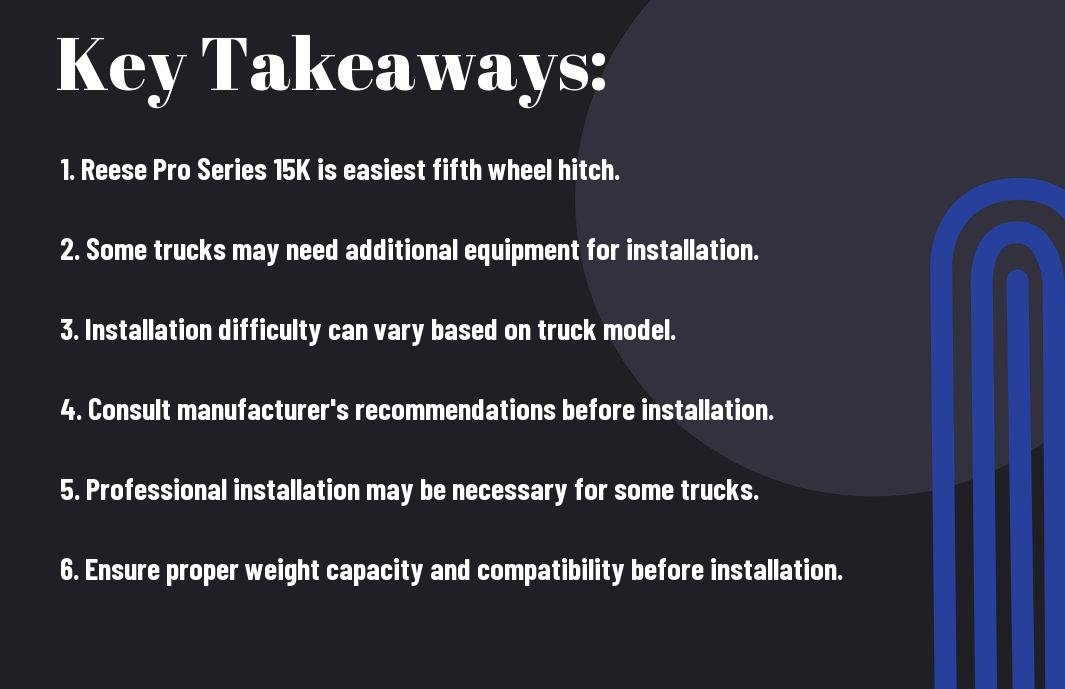When it comes to choosing the easiest fifth wheel hitch to install on your truck, there are plenty of options to consider. Whether you’re a seasoned RVer or a newbie to the world of towing, finding the right hitch for your truck is essential for a safe and hassle-free ride. But can you put a fifth wheel hitch on any truck? The answer is not as straightforward as you might think. In this blog post, we’ll explore the various factors that come into play when choosing a fifth wheel hitch for your truck, and we’ll provide you with valuable information to help you make the right decision for your towing needs.
Key Takeaways:
- Choosing the right fifth wheel hitch: Look for a hitch that is specifically designed for easy installation, such as a rail-mounted hitch that can be easily attached to pre-existing mounting points on the truck bed.
- Rail-mounted hitches: These are generally considered to be the easiest fifth wheel hitches to install, as they can be easily bolted onto the truck bed without the need for extensive modifications.
- Consider a universal installation kit: If you have a truck that does not have pre-existing mounting points for a fifth wheel hitch, consider using a universal installation kit that can be adapted to fit most truck beds.
- Professional installation: If you are unsure about installing a fifth wheel hitch on your own, it is always best to consult with a professional to ensure that the installation is done correctly and safely.
- Weight capacity and compatibility: Before installing a fifth wheel hitch, it is important to make sure that the hitch is compatible with your truck’s make and model, as well as being able to safely handle the weight of the trailer you plan on towing.
- Consider the truck’s towing capacity: Not all trucks are capable of handling a fifth wheel hitch and trailer, so it’s important to make sure that your truck is equipped to handle the additional weight and pressure.
- Consult the manufacturer’s guidelines: Before installing a fifth wheel hitch on any truck, it’s crucial to carefully read and follow the manufacturer’s guidelines to ensure proper installation and safe towing practices.

Understanding Fifth Wheel Hitches
While you may be familiar with traditional trailer hitches, fifth wheel hitches are a different beast altogether. These hitches are designed to handle heavier loads and provide greater stability and maneuverability, making them ideal for towing large trailers or RVs. However, they require a different installation process and are specific to certain types of trucks.
Definitions and Key Terms
When it comes to understanding fifth wheel hitches, there are a few key terms you should familiarize yourself with. Kingpin: The pin on the trailer that connects to the hitch. Pivot Point: The point where the trailer and truck connect, allowing for movement and turning. Gross Vehicle Weight Rating (GVWR): The maximum weight a vehicle is rated to safely carry, including its own weight and the weight of any cargo or passengers. Understanding these terms will help you grasp the mechanics of how a fifth wheel hitch operates.
Types of Fifth Wheel Hitches
When it comes to choosing a fifth wheel hitch, there are several options available. Fixed Hitch: A stationary hitch that provides a secure connection but limits maneuverability. Sliding Hitch: Allows for greater maneuverability by sliding back and forth, ideal for short-bed trucks. Gooseneck Adapter: An adapter that allows you to tow a fifth wheel trailer with a gooseneck hitch. Mounted Hitch: Installed directly into the bed of the truck for a secure and stable connection. Pivoting Hitch: Provides additional pivot points for improved maneuverability. This variety ensures that you can find a hitch that best suits your specific towing needs and vehicle type.
Easiest Fifth Wheel Hitches to Install
Despite the numerous options available in the market, not all fifth wheel hitches are created equal when it comes to ease of installation. When you are looking for a fifth wheel hitch that is easy to install, it is important to consider factors such as weight, design, and compatibility with your truck. To help you make an informed decision, we have compiled a list of the easiest fifth wheel hitches to install, along with the criteria for easy installation and our top picks for user-friendly fifth wheel hitches.
Criteria for Easy Installation
When evaluating the ease of installation of a fifth wheel hitch, there are several key factors to consider. The first and most important criterion is compatibility with your truck’s make and model. A fifth wheel hitch that is specifically designed for your truck will typically be easier to install as it will align perfectly with your truck’s bed. The second criterion is weight and design. A lightweight hitch with a user-friendly design can make the installation process much simpler.
Top Picks for User-Friendly Fifth Wheel Hitches
When it comes to user-friendly fifth wheel hitches, there are a few options that stand out. One of the top picks is the CURT Q20 5th Wheel Hitch. This hitch features a single-handle operation and a four-degree side-to-side pivot for easy hookup and disconnect. Another popular choice is the Reese Pro Series 15K Fifth Wheel Hitch, which is known for its easy installation and removal due to its simple design and lightweight construction.
Compatibility Considerations
To ensure the smooth and safe installation of a fifth wheel hitch, there are several compatibility considerations you need to take into account. These include the requirements of your truck, as well as identifying suitable trucks for installation.
Truck Requirements for Fifth Wheel Hitches
When considering a fifth wheel hitch installation, it’s crucial to ensure that your truck meets the necessary requirements. These will vary depending on the specific model and type of hitch you are looking to install. You’ll need to consider aspects such as the towing capacity of your truck, as well as the presence of necessary mounting points for the hitch. Additionally, you should also confirm whether your truck has a towing package or if any modifications are needed to support the fifth wheel hitch.
Identifying Suitable Trucks for Installation
Not all trucks are suitable for the installation of a fifth wheel hitch. When looking for a truck to pair with a fifth wheel hitch, it’s important to consider factors such as the truck’s towing capacity, bed length, and compatibility with specific hitch models. Your truck’s manufacturer may also provide guidance on which hitches are compatible with your specific model. It’s crucial to thoroughly research and identify a truck that can safely and effectively accommodate the fifth wheel hitch you intend to install.
Installation Tips and Tricks
After choosing the right fifth wheel hitch for your truck, it’s time to focus on installation. Here are some tips and tricks to make the process smoother:
- Read the manual thoroughly: Before you start, carefully read through the installation manual to understand the process and any specific requirements for your hitch.
- Use a friend: Having a second set of hands can make the installation process much easier, especially when lifting and positioning the hitch.
- Invest in the right tools: Make sure you have all the necessary tools on hand before you begin. A socket set, wrenches, and a torque wrench are typically needed.
- Check for tightness: After installation, go back and double-check all the bolts and connections to ensure they are secure. This is especially important for safety.
Perceiving these tips and tricks will help ensure a smooth and successful installation of your fifth wheel hitch.
Preparation for Installation
Before you begin the installation process, it’s important to gather all the necessary tools and equipment. This includes the fifth wheel hitch itself, as well as any additional hardware or accessories that may be required. Additionally, be sure to thoroughly read the installation manual provided by the manufacturer to familiarize yourself with the process.
Step-by-Step Installation Guide
When installing a fifth wheel hitch, it’s important to follow a step-by-step approach to ensure that everything is done correctly. Below is a basic guide to the installation process:
| Step | Details |
| 1 | Prepare the truck bed by cleaning it thoroughly and ensuring there are no obstructions. |
| 2 | Assemble the fifth wheel hitch according to the manufacturer’s instructions. |
| 3 | Position the hitch in the truck bed and secure it in place according to the provided guidelines. |
| 4 | Connect the necessary wiring and ensure all connections are secure. |
| 5 | Double-check all bolts and connections to ensure they are tight and secure. |
Following these steps will ensure a successful installation of your fifth wheel hitch.
Choosing the Right Fifth Wheel Hitch
With this in mind, it’s important to carefully consider the type of truck you have and the specific requirements for installing a fifth wheel hitch. While some hitches may be easier to install than others, it’s crucial to ensure that the hitch is compatible with your truck and that it meets the towing capacity needed for your RV or trailer. Additionally, not all trucks are equipped to handle a fifth wheel hitch, so it’s essential to consult with a professional to determine if your truck can accommodate this type of hitch. Ultimately, the easiest fifth wheel hitch to install will depend on your specific truck and towing needs, so be sure to do your research and seek expert advice before making a decision.
Frequently Asked Questions about Fifth Wheel Hitches
Q: What is the easiest fifth wheel hitch to install?
A: The B&W Companion Fifth Wheel Hitch is often considered one of the easiest to install. It features a fully articulating head for easy hookup and disconnection. Additionally, its simple frame brackets make installation a straightforward process, requiring minimal modifications to the truck bed.
Q: Can you put a fifth wheel hitch on any truck?
A: No, not every truck is compatible with a fifth wheel hitch. The truck must have the appropriate towing capacity and a compatible bed design to accommodate the hitch installation. Always refer to the manufacturer’s guidelines and consult with a professional to ensure proper fitment for your specific truck model.
Q: What are the key factors to consider when choosing a fifth wheel hitch for a truck?
A: When selecting a fifth wheel hitch, it’s essential to consider the towing capacity of your truck, the weight of the trailer, the type of towing you’ll be doing, and the bed size and configuration. Additionally, consider factors such as ease of installation, articulation, and build quality to ensure a secure and reliable towing setup.
Q: Are there any specific maintenance requirements for fifth wheel hitches?
A: Yes, regular maintenance is crucial for ensuring the continued performance and safety of a fifth wheel hitch. This includes periodic inspection of the hitch for signs of wear, lubrication of moving parts, and torque checks on the mounting hardware. It is also important to follow the manufacturer’s maintenance recommendations outlined in the product manual.
Q: Can I install a fifth wheel hitch on a truck by myself, or do I need professional installation?
A: While some individuals with mechanical expertise may be capable of installing a fifth wheel hitch on their own, it is generally recommended to seek professional installation. This is particularly important to ensure that the hitch is securely mounted to the truck and that all safety measures and installation guidelines are properly followed. Professional installation also helps to avoid potential warranty issues and ensures the most optimal setup for towing safety.
